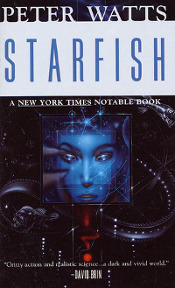
So it took some time, but I’ve finished Peter Watts’ Rifters trilogy, consisting of the novels Starfish, Maelstrom and Behemoth. That’s quite a lot of text, especially the last book which is as hefty as its name suggests, so much so that the dead tree version was split up into two volumes for commercial reasons. After liking Blindsight so much, I just had to read more stuff by Watts even though I knew this prior work wasn’t as well received. Unfortunately even with reduced expectations, I found the trilogy disappointing. It has a ton of cool ideas and a unique post-apocalyptic setting but the story as a whole just doesn’t gel together.
It’s hard to describe all three books in one post without delving into spoilers, so potential readers might want to keep out. The story begins in the middle of the 21st century. Due to global warming, the end of the cheap energy era as fossil fuels finally run out and global conflicts over increasingly scarce resources, the future is decidedly not rosy. Rising sea waters and frequent environmental catastrophes have caused the coasts of North America to turn into refugee zones. Cyberspace grows increasingly wild as self-evolving malware become ever more sophisticated.
The first book Starfish is set entirely on the bottom of the Atlantic ocean. With the world starved of energy, no expense is spared to exploit every bit of it available. One such source is geothermal power generated by deep ocean thermal vents. To maintain the facilities, an entirely new breed of humans are created: the Rifters. Since it deals with a small cast of characters who live entirely underwater, it has a tight focus and is easily the best of the three books. The events of the first book culminate in the discovery that one of these vents harbor a primordial nanobacterium that has been isolated from the rest of the world for millennia. The bacterium, christened Behemoth is exceedingly simple and is therefore ridiculously efficient. So efficient that it will wipe out the entire existing biosphere of the planet.
The second book Maelstrom takes place on land and deals with the spread of the Behemoth bacterium by one of the Rifters and efforts by various authorities to stop her. At the same time, the wildlife in cyberspace evolves in response to this massive manhunt and spontaneously coalesces into an entity that seeks to aid this Rifter. Behemoth takes place five years later when almost all of North America has been laid waste by the bacterium. The elite protect themselves by huddling behind their security barriers and static fields that keep the unwashed masses and the bacterium out.
As with Blindsight, the tone of the trilogy is unrelentingly dark. There’s even an arguably kick the dog moment in the form of a rape-torture scene. Being dark isn’t normally off-putting to me, but the problem here is that every character is insane to some degree. We get it, the Rifters are all psychologically fucked up because that’s what it takes to be able to survive at the bottom of the ocean but everyone else has issues too. Post-traumatic stress order, aversion to physical contact due to child abuse, sexual sadism, certified psychopathy, survivor’s guilt complexes, you name it, it’s in here. Not only does this make it impossible for the reader to empathize with any character, it also causes the characters to behave in all sorts of ridiculous ways because, well, they’re crazy.
Character motivations are all over the place, making for some very unconvincing plot developments. If you’re confused why a character is working towards a goal and does a complete one-eighty to work towards the opposite, the rationale here seems to be that the character is just as confused as you are. It makes for frustrating reading. At times, it seems as if Watts wants to say something interesting about neurochemistry determining behavior but there’s no pay-off, no resolution here. It’s just an incoherent mess.
The trilogy’s redeeming feature is that while the story as a whole doesn’t make such sense, some of the vignettes are entertaining as little windows into a fascinating world. I enjoyed reading about Achilles Desjardins’ work in taming chaos through information technology, about Taka Oullette traveling from a town to town in a high-tech mobile infirmary to care for the have-nots, about the day-to-day routines of the Rifters at Channer Vent and so on. I also liked the tech details such as the Rifters’ physical enhancements, how the Behemoth bacterium works and how individual malware can evolve into a sort of group organism.
But it seems to me that this should have been written as a series of loosely connected short stories rather than a grand epic. I’m glad that Watts eventually improved enough to write the fantastic Blindsight, which nicely addresses many of the faults present in the Rifters trilogy: tight focus, characters with distinct and believable motivations regardless of how different they are from normal humans, a higher density of cool ideas overall. As it is, I can’t recommend the Rifters trilogy to anyone. It’s just too crude and unfocused.